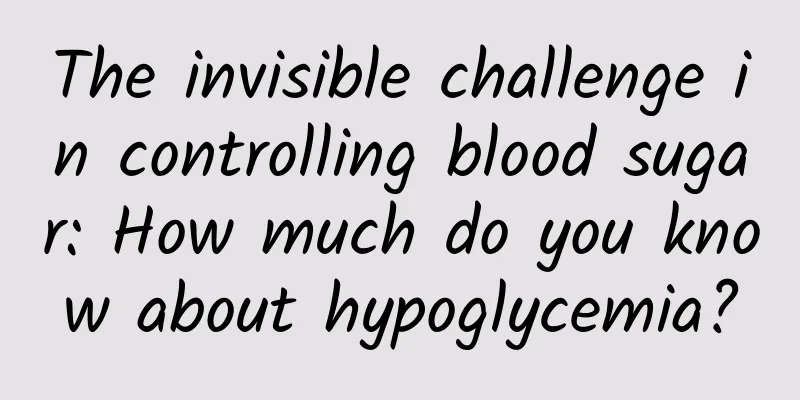The invisible challenge in controlling blood sugar: How much do you know about hypoglycemia?

|
Author: Zhu Jing, Hanzhong Central Hospital, Shaanxi Province Reviewer: Wang Yeju, Chief Physician, Hanzhong Central Hospital, Shaanxi Province In the world of diabetes, controlling sugar is a silent battle, and hypoglycemia, this "uninvited guest", often inadvertently becomes a "sweet trap" that diabetic patients need to be vigilant about. Through this popular science article, we will unveil the mystery of hypoglycemia for you, so that every "diabetic friend" can become the guardian of their own health. 1. Definition and hazards of hypoglycemia When the blood sugar concentration of a diabetic patient is ≤3.9 mmol/L, it is considered hypoglycemia. Hypoglycemia may not only disrupt the normal rhythm of life, but also bring serious health risks. Long-term and repeated hypoglycemia may also cause irreversible damage to the brain, increase the risk of cardiovascular disease, and seriously affect the patient's quality of life. Figure 1 Copyright image, no permission to reprint 2. Typical symptoms Typical symptoms of hypoglycemia include: ① sudden hunger, often accompanied by a strong desire to eat; ② palpitations and sweating, including accelerated heartbeat and cold skin, especially the forehead and palms; ③ dizziness, feeling top-heavy; ④ emotional instability, irritability, anxiety or depression; ⑤ inattention and memory loss, and in severe cases, confusion or even coma may occur. 3. Causes of Hypoglycemia There are many reasons for hypoglycemia in diabetic patients, and special attention should be paid to the following points: ① Excessive or improper use of hypoglycemic drugs; ② Irregular diet, especially not eating for a long time or eating too little; ③ Excessive exercise, especially exercise on an empty stomach, and failure to replenish energy in time after exercise; ④ Drinking, especially drinking on an empty stomach; ⑤ Impaired liver and kidney function, affecting drug metabolism and blood sugar regulation; ⑥ Taking other drugs that may cause hypoglycemia at the same time. IV. Preventive measures To prevent the occurrence of hypoglycemia, diabetic patients should do the following: ① Eat regularly, at regular times and in regular amounts, to ensure balanced nutrition; ② Exercise properly, avoid exercising on an empty stomach, monitor blood sugar before and after exercise, and replenish energy appropriately; ③ Strictly follow the doctor's orders for medication, and do not increase or decrease the dose or change the medication at will; ④ Monitor blood sugar regularly to understand the trend of blood sugar changes; ⑤ Carry sugary foods with you in case of emergency; ⑥ Carry a disease "ID card" (a card with diabetes, emergency contacts, and their phone numbers) when going out. Figure 2 Copyright image, no permission to reprint 5. Coping methods and self-help Once hypoglycemia occurs, diabetic patients should take self-help measures immediately: ① Quickly replenish sugar, such as sugary drinks, candies, biscuits, etc.; ② Monitor blood sugar to confirm whether blood sugar has returned to normal; ③ If the symptoms are severe or cannot be relieved, seek medical attention immediately. 6. Medication Adjustment and Management Diabetic patients should closely monitor their blood sugar, consult a doctor when appropriate, and adjust the type and dosage of hypoglycemic drugs according to the doctor's advice. When using insulin or insulin secretagogues, special attention should be paid to the time and dosage of use to avoid overdose and improper use. At the same time, information such as the half-life and peak time of commonly used hypoglycemic drugs should be understood in order to better self-manage blood sugar. 7. Dietary advice and monitoring A reasonable diet is the key to preventing and controlling hypoglycemia in diabetes. Diabetic patients should follow the following dietary recommendations: ① Eat foods that do not cause a sharp rise in blood sugar levels after eating: such as whole grains, beans, fresh fruits and vegetables, etc.; ② Control total calorie intake and avoid overeating; ③ Eat meals at regular times and in fixed amounts to avoid not eating for a long time or eating too little; ④ Eat a balanced diet to ensure a reasonable intake of protein, fat and carbohydrates; ⑤ Monitor blood sugar after meals to understand the effects of different foods on your own blood sugar. Let us, together, use knowledge as a shield and science as a sword to bravely face the challenges brought by diabetes, stay away from the "sweet trap" of hypoglycemia, protect our own health and happiness, and enjoy a healthy life. References Chinese Medical Association Diabetes Branch. Guidelines for the prevention and treatment of type 2 diabetes in China (2020 edition)[J]. Chinese Journal of Endocrinology and Metabolism, 2021, 37(4): 311-398. |
<<: Does your child keep blinking? Beware of abnormal blinking in children!
>>: Do you carefully observe your urine every time you go to the toilet?
Recommend
When do girls grow hair?
Both girls and boys will begin to develop at a ce...
How to prevent goldfish from breeding in autumn? How to remove the fishy smell from the fish tank?
There will be some fishy smell when raising fish ...
Probiotics - the "nutritional magician" in the intestines. Your stomach and intestines need it during the Spring Festival.
The New Year is coming soon. Which of the followi...
How to judge whether the flow is clean
Pregnancy itself is a very happy thing, but if yo...
What are the early symptoms of female infertility?
Maybe many female friends have experienced the pr...
Windows Phone sales in Q4 2012 have far exceeded the same period last year
Windows Phone sales in the fourth quarter of this...
What is the reason for acne lumps on the vulva?
Acne appears on the vulva, and it feels hard to t...
Can ultrasound show pregnancy at 4 weeks?
Pregnant women want to see a doctor for some exam...
I was very irritable after giving birth.
It is normal to have a bad temper after giving bi...
What is the reason for less menstrual flow?
What is the reason for light menstrual flow? Some...
Actively lead a healthy life, and exercise creates wonderful things - a wheelchair hero's autobiography
Authors: Xie Haixia, Pan Jing; Chief Judge: Zhai ...
How to lower high cholesterol? Understand the risk level, take targeted measures, and help restore blood lipids to normal
Relevant data show that cardiovascular and cerebr...
What is the normal endometrium? Gynecologists tell you
Under normal circumstances, the thickness of a wo...
How to get rid of phlegm quickly for pregnant women
Pregnant women will experience many symptoms duri...









